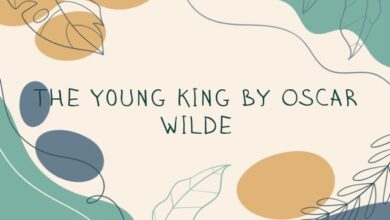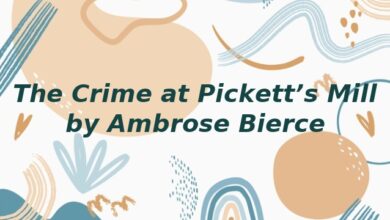
Patsy by Ralph Henry Barbour
He made his first appearance one afternoon a week or so before the Fall Handicap Meeting. Mosher, Fosgill, Alien, Ronimus, and several more of us were down at the end of the field putting the shot. Fosgill, who was scratch man that year, had just done an even forty feet and the shot had trickled away toward the cinder path. Whereupon a small bit of humanity appeared from somewhere, picked up the sixteen pounds of lead with much difficulty, and staggered back to the circle with it.
“Hello, kid,” said Fosgill; “that’s pretty heavy for you, isn’t it?”
“Naw,” was the superb reply; “that ain’t nothin’!”
We laughed, and the youngster grinned around at us in a companionable way that won us on the spot.
“What’s your name?” asked Ronimus.
“Patsy.”
“Patsy what?”
“Burns.”
“How old are you?”
“‘Leven.”
“You’re a Frenchman, aren’t yon?”
“Naw.”
“You’re not?” Ronimus pretended intense surprise.
“He’s a Dutchman, aren’t you, Patsy?” said Mosher.
“Naw.”
“What are you then?”
“Mucker,” answered Patsy with a grin.
For the rest of that day and for many days afterwards Patsy honored us with his presence. After each put he ambled forth, lifted the metal ball from the ground with two dirty little hands, snuggled it against the front of his dirty little shirt, and labored back with it. At the end of the week Patsy had become official helper.
He was a diminutive wisp of humanity, a starved, slender elf with a freckled face, wizened and peaked, which at times looked a thousand years old. It reminded you of the face of one of those preternaturally aged monkeys that sit motionless in a dark corner of the cage, oppressed with the sins and sorrows of a hundred centuries. And yet it mustn’t be supposed that Patsy was either a pessimist or a misanthrope. Patsy’s gray Irish eye could sparkle merrily and his thin little Irish mouth usually wore a whimsical smile. It was as though he realized that life was but a hollow mockery and yet had bravely resolved to pretend otherwise, that we, young and innocent, might still preserve our cherished illusions.
We made a good deal of Patsy. We pretended that he was very, very old and sophisticated–not a difficult task–and deferred to his judgment on all occasions. But in spite of this Patsy never became “fresh.” To be sure, he speedily began calling Fosgill “Bull,” but I don’t think he meant the slightest disrespect; everyone called the big fellow “Bull,” and it is quite possible that Patsy believed it to be a title of honor. He was attentive to all of us, but his heart was Fosgill’s. He used to wait outside the Locker Building until we came out after dressing and then walk beside Fosgill until he reached the Square. Then Patsy would say:
“Good night, Bull.”
And Fosgill would answer gravely:
“Good night, Patsy.”
And Patsy would disappear.
But the evening of the Handicaps we took him back to the boarding house with us, and he sat beside Fosgill and ate ravenously of everything placed before him. We learned Patsy’s life story that evening. He went to school–generally. He lived with Brian. Brian was his brother, eighteen years old, and a man of business; Brian drove for Connors, the teamster. Patsy wasn’t sure that he had ever had a mother, but he was absolutely certain about his father. He still had vivid recollections of the night they broke down the door and put the handcuffs on father after father had laid out the lieutenant with a chair. Patsy didn’t know just what father had done, but he had an idea it was something regarding the disappearance of numerous suits of clothes from a tailor’s shop. Patsy was going into business himself just as soon as they let him stop school; he was going to sell papers. He had tried several times to wean himself from education, but each time they haled him back to the schoolhouse. Patsy thought the thing was terribly wrong.
When the snow covered the field we saw Patsy only occasionally. In the spring we got to work early. We believed we had a good show to win the Dual that year and a fighting chance at the Intercollegiate. We were strong on the sprints and distances, fair at the jumps and hurdles, and rather weak at the weights. We had a good man in Fosgill at the shot put, but that’s about all. Along in May we had it doped out that if we could get first in the shot put we could win out by a point or two. But there wasn’t anything certain about it, for our opponent was strong on second, near-“second,” and third-place men.
Patsy appeared with the first warm day, looking thinner and littler and older than ever. That first day the assistant manager was holding the tape for us, and it occurred to him to pick up the shot and toss it back. But he did it only once. The next time Patsy was astraddle of that sixteen-pound lump and was looking the assistant manager sternly in the eye.
“I’m doin’ this,” said Patsy.
After that he did it and no one disputed his right. When the gates were closed and fellows had to show their H. A. A. tickets to get in, Patsy was admitted without question. When all the other youngsters for miles around were gluing their faces to the iron fence watching the baseball games, Patsy’s allegiance never faltered. He was somewhere around Fosgill, regarding that hero with worshiping gaze. It was in May, I think, that Patsy made his Great Resolution. He confided it to us on the steps of the Locker Building when we were waiting for one of the crowd.
“I’ve decided not to go into business,” said Patsy.
“What are you going to do?” asked Billy Allen.
“I’m going to college,” replied Patsy easily. “I’m goin’ to be a shot putter.”
“Good for you, kid!” said Billy. “What college you going to?”
Billy winked at us and we watched eagerly while Patsy’s countenance took on its expression of lofty contempt.
“Huh!” said Patsy. That was all, but that eloquent monosyllable consigned all other colleges than ours to the nethermost regions.
“But you’ll have to go to school a long time, Patsy,” said I, “if you expect to get into college.”
“Yep, I know. It’s tough, but I guess I can do it. Was–was it hard for you?”
I was forced to acknowledge that it had been.
“An’ you ain’t much of a shot putter, either,” said Patsy reflectively.
Fosgill had done forty-two, eight and a half that afternoon and we were feeling pretty hopeful and good-natured after dinner. Some, one mentioned Patsy, and Mosher spoke up:
“Say, fellows, let’s see that that little cuss does get into college. What do you say?”
“I’ll go you!” cried Fosgill. “He’s an all-right kid, is Patsy, and he deserves something better than spending his life on the streets. We’ll adopt him.”
“Sure thing,” said Allen. “But we’ll have our hands full. And what’s to happen when we leave college?”
“We’ll get some one to look after him We’ll have a talk with Brother Brian about it. But, say, Bull, imagine Patsy putting the shot!”
We laughed at that–which we wouldn’t have done if Patsy had been there.
“Well, I guess he won’t make much of a show at athletics,” said I, “but if we keep him off the streets we’ll be doing a whole lot. And I like Patsy.”
We all did. And before we left the table that night we had the thing mapped out. Patsy was to be cared for and looked after. He was to finish grammar school, go to Latin school, and then to Harvard. And there were to be funds where they’d do good. Yes, we had it all fixed up for Patsy and we’d have done it just as planned if Patsy hadn’t gone and spoiled it all. And it happened like this:
When the Dual Meet came along in June we were all to the good. We couldn’t see how we were to lose first in anything except the quarter, the high hurdles, the hammer throw and the broad jump. And we had enough seconds and thirds in sight to make good. If Bull Fosgill could beat Tanner with the shot we were it.
That’s the way we had the situation sized up, but of course things don’t happen just as expected; they seldom do in athletics. Some of the firsts we had claimed went glimmering and we took in seconds and thirds where we hadn’t expected them. But the final result was just about what we had figured it, and along toward five o’clock the meet depended on the outcome of one event, and that event was the shot put. To be sure, they were still fussing with the pole vault, but we were certain of first and third places and so could discount that.
By some freak of fortune I had managed to qualify with a put of thirty-eight, one and a half. There were four of us in the finals, Fosgill, Tanner and Burt of the enemy, and I. Of course Patsy was there, and he worked like a Trojan. You could see, though, that it went against the grain with him to fetch for our opponents; Patsy had a good deal of the primeval left in him. And it’s safe to say that no one there was more interested. I don’t think he doubted for a moment that Fosgill would win, and I fancy he thought me pretty cheeky for aspiring so far as the final round.
Fosgill was ahead with forty-one, ten and a half, Tanner had done three inches under that, and Burt and I were fighting along for third place, doing around thirty-eight, six. It was pretty close work, and even the officials were excited. We had finished one round when the accident occurred.
Tanner was in the circle. Fosgill was down near the end of the tape and Patsy was close behind him. Tanner hopped across the circle, overstepped–fouling the put–and sent the shot away at a tangent. Fosgill had turned his head to speak to the measurer and never saw his danger. Tanner let out a shout of warning, and others echoed it. But it was Patsy who acted. He threw himself like a little catapult at Fosgill and sent him staggering across the turf. Then Patsy and the shot went down together.
It was all beastly sudden and nasty. When we bent over that poor little kid he was sort of greenish-white and I’ll never forget the way his freckles stood out. The shot had struck him on the breast and Patsy’s weak little bones had just crushed in. Well, we did all we could; put him in a carriage at the gate and rushed him to the hospital. He was still breathing, but the doctor said he never knew anything after the shot struck him–not until evening. Well, we were all frightfully cut up, and Tanner sat down on the ground and nearly fainted. Fosgill kept saying “Poor little Patsy! Poor little kid!” half aloud and walking around in circles. He wanted to go to the hospital with him, but we told him he could do no good, and we each still had two puts.
After a while we got our nerve back after a fashion, and went on, but, thunder! not one of us was worth a hang. I did thirty-six and thirty-seven, eleven, and won third place at that. Neither Fosgill nor Tanner equaled his first records and the event went to Bull at the ridiculous figures of forty-one, ten and a half. We got the meet by four and a half points. It was almost six o’clock by that time, and Fosgill and I and three others piled into Alien’s auto and raced up to the hospital.
They had just taken Patsy off the operating table and put him to bed. The doctor told us that the examination showed that there was nothing to be done; the heart had been injured and was liable to stop work any moment. Fosgill got the doctor to promise to call him up on the ‘phone if Patsy showed any signs of consciousness. And he left orders that everything possible was to be done. Tanner had begged us to look after the kid and let him pay everything, but though we promised, we hadn’t any idea of doing it; Patsy was our kid. We went back to training table, but we were a low-spirited lot. And just when we were finishing dinner the call came from the hospital.
We made a record trip in Billy’s machine and when we tiptoed into the accident ward the nurse smiled at us. And so did Patsy. He was a pathetic-looking little wisp as he lay there with the bedclothes lifted away from his body, but he smiled and moved his head a bit on the pillow. Fosgill sat down at the head of the cot and leaned over, his mouth all atremble.
“Hello, Bull!” whispered Patsy.
“Hello, Patsy!” answered Fosgill, trying to smile.
“Did you–beat him?”
“Yes, Patsy.”
“I knew–you would. I told–him so.” He glanced at me: “Did you–beat–that–other chap?”
I nodded and Patsy looked at me with a new respect.
“Good–for you,” he whispered.
“Are you–does it hurt much, Patsy?” asked Fosgill.
“No, not much.”
“That’s good. We’ll have you out before long.”
Patsy grinned.
“Shut up!” he whispered. “You can’t–fool me, Bull. I’m–a goner.”
Fosgill muttered something and Patsy’s eyes brightened.
“Bull,” he whispered, “do you–think I–had a mother–like–other kids?”
“I know you did, Patsy.”
“That’s good,” sighed the kid happily. “I guess–may be–I’ll see her–where–I’m goin’.”
“You saved my life, Patsy,” muttered Fosgill, “and there isn’t a thing I can do for you. I wish–oh, it’s a shame, kid!”
“Huh! I’m glad–Bull. I’d–‘a’ done most anything–for you, Bull. You’ve been good–to me; so’s the–others.” He closed his eyes wearily for a moment. Then, “Do you think,” he asked slowly, “I could–have learned–to put–the shot, Bull–some day?”
“Yes,” answered Fosgill sturdily. “You had the making of a great shot putter, Patsy. You’d have made a record for yourself, I’ll bet!”
“Are you–kiddin’–me, Bull?”
“No, Patsy. I’ll leave it to the others. Isn’t it so, fellows?”
We nodded vehemently, and Patsy closed his eyes with a smile of ineffable content on his little face. Presently the eyes flickered open again.
“Anyhow,” he said quite strongly and with an approach to his old air of self-importance, “anyhow–I guess I won–for Harvard–to-day. Huh?”
“Yes, you did, Patsy,” answered Fosgill. “We’ve got you to thank for it, dear little kid.”
Patsy smiled. Then:
“Good-by–Bull,” he said very softly. His eyes half closed.
We waited in silence while the moments crept by, but Patsy didn’t speak again.





